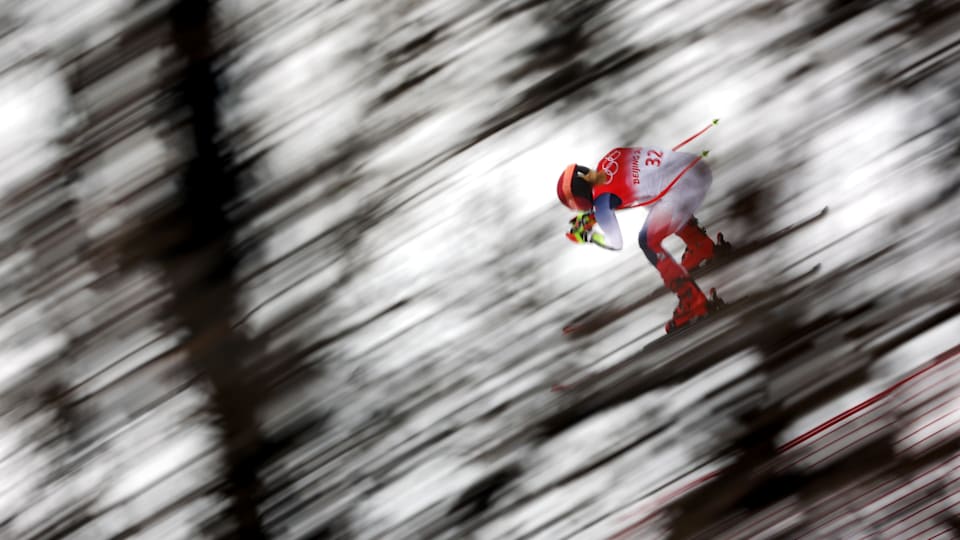Mikaela Shiffrin: It’s hard to say that everything is better
The double Olympic champion tells Olympics.com how she's still dealing with grief, almost two years after her father Jeff's tragic death.

"I'm smiling more and I feel more moments where I'm happy. But it's a little bit hard to say that everything's better," alpine skiing super star Mikaela Shiffrin tells Olympics.com.
Almost two years after the tragic death of her father, Jeff, the double Olympic champion is still trying to cope with grief.
"I still have moments that I forget how to walk... It's like all of a sudden I'm back to February 3rd, 2020 and that everything just happened," she continued. "So that feeling hasn't gone away and I'm not sure that it will go away, but you learn to appreciate the good moments and I still have good moments."
The American admits she can count on the support of 'some incredible people', including her family, friends and team.
"Over the last year and a half, I think the biggest thing that that's developed again is the appreciation I have for what is still here versus the oppression I feel about what's gone."
Shiffrin: You just have pain
Sports psychologists are becoming an increasingly common tool for athletes to use in the search for optimal performance. After experiencing the turmoil of losing a loved one, Shiffrin decided to reach out.
"When my dad died, essentially it's an injury, but it's one that nobody can see. And you don't need a surgery to fix it, but it's the kind of injury that you have no timeline, you have no instructions. You just have pain.
"I never experienced something like that in my life. I mean, I had some physical injuries and I've even had surgeries in my career but, you know, bones heal in eight weeks and your knee recovers on a certain timeline, and even the back is something that is a little bit more unpredictable. But still, you have some idea of what you're dealing with, and that was just something totally different."
The 26-year-old is aware that the recovery process will take time.
"You don't have somebody who can give you a rulebook, but when I started talking with the sports psychologist about the sports side of things, it helped me to make some connections as well... Time is one thing that can be helpful. And then also remembering how I was before - if it makes sense: I can't go back, but I can remember some of the feeling that I had before and some of the strength that I had.
"But I think it just requires a little bit more effort in that area and bring back my focus and the, you know, the intensity that I can feel on race day and kind of that fire and then we can kind of start putting all those pieces together."
Shiffrin on Beijing 2022: I hope I can walk away with some medal
At just 18 years of age, Shiffrin became the youngest Olympic slalom champion with her gold at Sochi 2014.
Four years later, she entered PyeongChang 2018 as the heavy favourite and walked away with two medals, including gold in the Giant Slalom.
What's her approach ahead of Beijing 2022?
"As a person I feel very similar," she revealed. "I've learned some things along the way as an athlete. I feel much more aware going into this Olympics about what the possibilities are, both the good possibilities and also the bad possibilities. Because in Sochi, I experienced, I would say a very like 'ideal' Olympic experience. It wasn't perfect conditions and everything wasn't totally, totally perfect, but it was good enough that I felt like, 'Yeah, it's simple and it's just ski racing.'
"And then in South Korea, I experienced sort of the worst that can happen with the schedule changes, with the weather, with the wind...But the truth is you cannot have the biggest event globally with sports events across all the different winter sports, multiple events held in the span of two weeks in a single place, and expect that it's going to be the ideal set up for every single event and competition.
"And that's actually not what the Olympics are for, even though it is a competition and we talk about the medals. There is a whole different side of it, which I think is way more important. It's the unity and what we actually bring the world together to feel some sort of camaraderie through sport and how powerful that actually is." - Mikaela Shiffrin to Olympics.com
"But I'm still going with the goal in the hope that I can walk away with some medal, with a medal, with something. So that's the way it is for all of us athletes. It's really hard to let go of the dream of having Olympic medals and actually, you don't need to let go of it. I think ifor me, it's real important to realise that there's a lot of other things going on as well. And you don't have control over whether you win a medal. You only have control over how you compete. And and that's really it."
